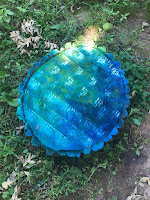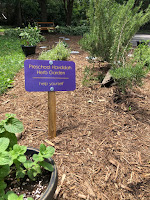We'll be looking for gardeners and carpenters and anyone with a passion for outdoor learning. Stay tuned for more details and thank you in advance. Have a wonderful summer and see you in September!
Morah Jen
Monday, June 21, 2021
Outdoor Magic
We'll be looking for gardeners and carpenters and anyone with a passion for outdoor learning. Stay tuned for more details and thank you in advance. Have a wonderful summer and see you in September!
Friday, May 14, 2021
Shavuot -- Do we really need all these rules?
We've quite literally been counting down the days until our next holiday, Shavuot, which begins in a few days. Starting on the second night of Passover, we count every day until we reach 50. Since we celebrate receiving the Torah at Mt. Sinai on Shavuot, it makes sense that the holiday is linked to Passover. After leaving Egypt, the Israelites spent seven weeks in the desert before entering into the covenant with God.
- We are commanded to pay workers the day they complete their work so as not to take advantage of them: "On his day you should give his wages, the sun should not set on it, because he is a poor man and his life depends on it…"
- "Do not put a stumbling block before the blind," which can be interpreted to mean that we shouldn't put any kind of barrier in front of anyone on their way to success or happiness
- "Love your neighbor as yourself."
A great story to share with your children is No Rules for Michael by Sylvia A. Rouss. Michael thinks school would be more fun without rules, so his teacher (wisely) suggests a day without rules. Quickly Michael becomes frustrated and sad. At the end of the book he says, "No one will listen to me. No one will give me a turn. No one will share. I guess rules are important. Rules show people how to care about each other."
Friday, February 5, 2021
Shabbat Bags and the Family Prayer
"More than the Jewish people have kept Shabbat, Shabbat has kept the Jews."
-- Ahad Ha'am
Over the past few weeks, our friends have been busy making kiddush cups, candle sticks, challah covers, and/or tzedekah boxes to fill their very own Shabbat Bags. In the past, each class has shared a Shabbat Bag, with a different friend taking the bag home each week. Things are a little different this year.
Today, every child will go home with the ritual items and a copy of the blessings needed to make Shabbat, and every week we'll send a friend home with a bottle of grape juice, candles, and baby challahs from our neighbors at Great Harvest. We hope you'll take a picture of your family celebrating (or getting ready to celebrate) Shabbat and send them to your child's teacher to share on the class blog. Whatever your family's faith tradition or level of observance, we hope you find this family dinner tradition as meaningful as we do.
Tuesday, December 15, 2020
Three Reasons Why This is One of the Best Years Ever
Friday, December 4, 2020
The Potential for Light
Everyone knows the story of Chanukah:
Friday, November 13, 2020
Shabbat Blessings -- Our Children
A few weeks ago we started reading the first book of the Torah, Breishit (Genesis). It's in these stories that we meet the patriarchs and matriarchs and learn how the Ancient Israelites ended up in Egypt generations later.
A lot of "blessing" goes on in these stories. Gob blesses Abraham, Isaac blesses Jacob (a blessing Jacob steals from his brother Esau), and Jacob blesses the sons of his son Joseph, Ephraim and Menashe.
The "priestly blessing," known to many, refers to this blessing of Jacob's. It has become traditional for Jewish mothers and fathers to give their sons and daughters this blessing on Friday evenings, often right after lighting Shabbat candles.
Thursday, October 29, 2020
The Science of Shabbat Dinner
Every now and then I’ll come across a study that seems to confirm the importance or validity of a Jewish tradition. This happened a few years ago when I read about the research promoting the importance of the family dinner and immediately connected it with the Friday night Shabbat meal. In addition to the traditional and spiritual benefits of celebrating Shabbat as a family, there are countless other benefits to simply sitting down together a few times a week to enjoy a meal together.
Outdoor Magic
Early childhood educators have long known the benefits of outdoor play . To name but a few, outdoor play improves physical and mental heal...

-
Today, four teachers and I attended a workshop on teaching language and literacy in an emergent environment. We definitely do not start...
-
By the end of September, we'll be reading the final chapters of the book of Deuteronomy. Moses will remind the people of the covenant ...
-
Activity: It's a Box! Give children boxes to build and play with and just step back. Their creativity will astound you. Materials ...









